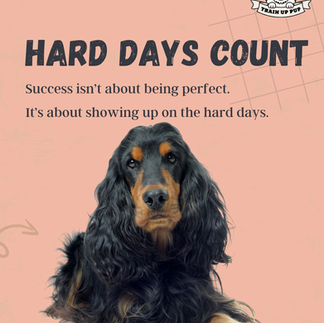Progress Over Perfection: The Real Goal in Dog Training
- Ellen Greenwood-Sole
- Sep 19, 2025
- 3 min read
Progress may feel painfully slow, and perfection may feel a million miles away—but that’s okay.
In fact, that’s exactly how it’s supposed to be.
It’s easy to get caught up in chasing perfection. Social media makes it look like everyone else’s dog walks politely, recalls instantly, and happily tags along to cafés, festivals, and crowded pubs. But here’s the truth: perfection was never the aim in the first place.
Imperfect progress is always better than avoiding the work altogether.
The Trap of Avoidance
When our dogs struggle—maybe they become reactive around other dogs, or bark at strangers—it’s natural to want to avoid the problem. We cross the road, we walk at quieter times, we keep them away from anything that might trigger them.
It feels kinder. Safer.
But over time, that avoidance makes your dog’s world smaller and smaller. They never get the chance to learn how to cope with the things that worry them, because they’re never exposed to those situations in a way they can handle.
Now, I’m not saying throw them into the deep end and hope they figure it out. That’s the opposite of good training. But we do need to support them as they learn to cope. Carefully, gently, at their pace—step by step.
Showing Up on the Hard Days
There’s a quote I love:
“Success isn’t about being perfect. It’s about showing up on the hard days.”
Dog training is full of those hard days. The days when nothing seems to click. The days when you wonder why you ever got a dog in the first place. Yes, people have those thoughts—and it doesn’t make you a bad owner.
Those are the days that matter most. Because showing up anyway, even when it feels like nothing is working, is progress.
Keep Your Goals Realistic
Here’s something we don’t talk about enough: we can’t change who our dogs are at their core. Training can shape behaviour, build skills, and give them confidence—but it can’t rewrite their personality.
My own collie, Piper, is a perfect example. She’s five now and very much a traditional working collie. She loves nothing more than being at home, working sheep, or running across the moors.
She can absolutely come to a busy pub or stroll through a packed town centre. She’ll look like the perfect dog while she does it—calm, polite, well-trained. But if you watch closely, you’ll see the truth: she’s just tolerating it. Underneath, she’d much rather be at home, curled up in her own space or out on the hills.
Social media often sells us a goal of the “everywhere dog”—the one who hikes mountains in the morning, shops in the city at noon, and joins friends for cocktails in the evening. But should that really be the goal?
For some dogs, it’s just not who they are. And that’s okay.
Progress Is the Goal
Progress might mean your reactive dog can now walk past one calm dog without barking. It might mean they recover faster after a trigger. It might mean you notice their signals sooner and help them out before they panic.
That is success.
For Piper, progress is being able to calmly handle the occasional pub visit when it’s necessary, not because I expect her to love it, but because I’ve supported her in learning to cope when life calls for it. My goal isn’t to turn her into a social butterfly—it’s to respect who she is while giving her the skills to navigate the world when she needs to.
Take the Pressure Off
Your dog doesn’t need you to be perfect. And they don’t need to become someone they’re not.
Every small step counts. Every tiny win adds up. Celebrate it. And when you have a rough day, remember that those days are part of the process too.
Progress over perfection—always. And goals that honour who your dog truly is.






















Comments